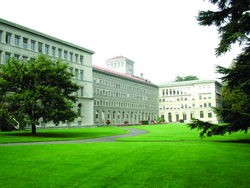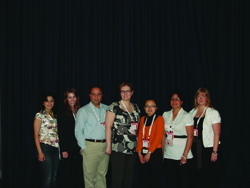
 So-called “last-chance” talks collapsed in late July during a
So-called “last-chance” talks collapsed in late July during a
ministerial meeting of the Doha development round at the World Trade
Organization in Geneva after the United States, China and India
failed to compromise on farm import rules.
 Trade Talks Colapse
Trade Talks Colapse
So-called “last-chance” talks collapsed in late July during a ministerial meeting of the Doha development round at the World Trade Organization (above) in Geneva after the United States, China and India failed to compromise on farm import rules.
The issue in question concerned a “special safeguard” that developing countries India and China have demanded they need to deal with a sudden surge of imports or drop in prices. These emergency import tariffs are wanted by China, India and other developing countries to protect domestic farmers against cheap imports. The U.S. and several other developed nations had accused both China and India of insisting on allowances to raise farm tariffs above their current levels, which the U.S. contends violates the spirit of the trade round.
After nine days of talks, WTO chief Pascal Lamy informed ministers that convergence could not be reached, sparing any threat to Canada’s supply-managed sectors, at least for the interim.
Canadian Trade Minister Michael Fortier stated in a release “Canada will move aggressively to negotiate the individual country-to-country trade deals to protect its economic interests.”
However, analysts say that Canada is at least five years behind on the game on this tactic, unlike the U.S., who started concentrating on bilateral deals during Doha round talks in Cancun, Mexico in 2003. Canada also has a much smaller market.
Shirley-Anne George, head of policy for the Canadian Chamber of Commerce was quoted as saying “this is not good for Canada because we don’t have the economic might to force what we need in bilaterals the way the U.S. and Europe does.”
Fortier and Agriculture Minister Gerry Ritz were reported to be cautiously optimistic that talks could resume soon, outlining several obstacles, the primary being that many countries involved are entering into election cycles.
In early August, Ambassador Crawford Falconer, chairman of the special session of the committee on agriculture, stated in his report to the trade negotiations committee that breakdowns over special safeguards was not technical but political.
He says to fix the problems in less than a three-year time frame, efforts need to be made in the very near future, and the only way this has ever been achieved is through intensive work at the senior officials’ level.
PRC Excels
The Poultry Science Association (PSA) recognized the research excellence at the Alberta Poultry Research Centre (PRC) during its centennial meeting in Niagara Falls in late July.
Dr. Frank Robinson was named a Fellow of the Poultry Science Association. Election to Fellow is one of the highest distinctions a PSA member can achieve. Dr. Doug Korver received the American Feed Industry Association Poultry Nutrition Research Award for distinctive work demonstrating sound research in poultry nutrition. Dr. Martin Zuidhof was recognized by the National Chicken Council Broiler Research Award for distinctive research work that has a strong economic impact on the broiler industry. Felicity Dennis received the Tyson Foods Support Personnel Award to acknowledge her long-term role in assisting faculty in poultry research.
Undergraduate student Lukas Kawalilak was awarded the PSA Student Research Paper Certification of Excellence. Graduate student Mojtaba Yegani won the PSA Student Essay Competition for his essay on “The Future of Poultry Science.” Former graduate student Victoria Sikur received the PSA Early Achievement Award. Dr. Gita Cherian was recognized for her research manuscript by the American Egg Board Research Award. Dr. Cherian received her MSc and PhD from the Department of AFNS at the UofA. She is currently an associate professor with the Oregon State University, Department of Animal Science.
Charity Golf
 |
| (Left to right) OFAC executive director Crystal Mackay, EFO Chair Carolynne Griffith, and Ethel Johnstone presented the cheque to OFAC Chair Jim Maskaant. |
More than $10,000 was raised by the Jim Johnstone Memorial Golf Tournament, held in June by the Egg Farmers of Ontario (EFO) and the Ontario Farm Animal Council (OFAC).
The funds will aid OFAC in its ongoing quest to bridge the gap between farmers and the general public.
Bill 50
In the wake of a precedent-setting decision by the New Jersey Supreme Court, animal protection and environmental organizations are calling on Premier Dalton McGuinty’s government to amend Bill 50, The Provincial Animal Welfare Act, 2008 by removing all Sections of the bill that exempt wildlife, research and farm animals from protection under the Act.
The N.J. Supreme Court recently ruled that “factory farming practices cannot be considered humane simply because they are widely used… Many states have an exemption to their cruelty code for “routine” or “commonly accepted” practices which leaves animals confined in factory farms unprotected from abuse.”
Currently, exemptions in Bill 50 prevent the OSPCA from investigating and laying animal cruelty charges for agricultural animals kept in accordance with reasonable and generally accepted practices. The Animal Alliance of Canada wants this amended so that farm animals will receive basic protection.
COOL Disappoints Ritz
Agriculture Minister Gerry Ritz says he’s disappointed with the Country Of Origin Labelling (COOL) in the recent Farm Bill passed by U.S. Congress. This legislation is mandated as of Sept. 30, 2008, and impacts chicken, beef, lamb, pork, and goat meat, along with perishable agricultural commodities.
“We will analyze the recently released rule to determine the economic impacts on integrated North American markets,” Ritz says. He also remains concerned that it may discriminate against Canadian products.
Since the Canada-U.S. Free Trade Agreement, and then the North American Free Trade Agreement, trade between Canada and the U.S. has tripled. Eliminating obstacles to trade has contributed to mutually beneficial supply chains, making both countries more competitive domestically and internationally.
Efforts are being made to ensure that the COOL guidelines remain consistent with the United States’ trade obligations and existing international standards.
Students Attend WPC
 Eight Canadian poultry science graduate students received funding from national agencies to present their research at the XXIII World’s Poultry Congress, held in Brisbane, Australia.
Eight Canadian poultry science graduate students received funding from national agencies to present their research at the XXIII World’s Poultry Congress, held in Brisbane, Australia.
Above are: University of Saskatchewan graduate students Samira Dadgar, Joni Rynsburger, Salaheddin Ebsim, and Alison Ward; University of Manitoba graduate student Wei Jia; University of British Columbia graduate student Renu Singh; and Jennifer Saunders-Blade, a recent PhD graduate from the University of Alberta.
The CTMA provided funds for Samira Dadgar. The other students were partially funded by CEMA and CHEP (formerly CBHEMA).
Print this page